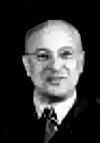- Mark Vishniak
-
Mark Veniaminovich Vishniak (1883-1977) was a Russian socialist, journalist and writer.
Contents
Early Activism
M.V. Vishniak was born in Moscow in 1883, the son of a wealthy merchant. He was a childhood friend of the future Socialist-Revolutionary leaders A.R. Gots and I.I. Fondaminsky. As a law student at Moscow University he came in contact with Narodnik circles, but he did not join the Socialist-Revolutionary Party (PSR) until 1905, when he was radicalised by the Revolution of 1905. He was a delegate at the PSR Congress in 1906. Vishniak contributed to several party journals under the pseudonym 'Veniamin Marks'. Under that name he wrote The Legal Status of Jews in Russia, one of the earliest sustained discussion of the condition of Russian Jews. In 1906 he was arrested and deported Narimski but escaped. Over the next ten years, he was repeatedly arrested, escaped several times and spent time abroad (mainly in France).
Defencism and Revolution
In 1914 he took a Defencist position. After the February Revolution of 1917, he was elected to the All-Russian Congress of Soviets of Peasants' Deputies and to the Executive Committee of the All-Russian Soviet of Peasants' Deputies. Vishniak belonged to the commission which drafted the proceedings for elections to the Constituent Assembly. He belonged to the Interim Council of the Repuiblic (Pre-Parliament) and was elected to the short-lived Constituent Assembly (which the Bolsheviks suspended after one day).
Vishniak was fiercely opposed to the October Revolution. He prticipated in anti-Bolshevik activities. In 1918 he moved to Ukraine, where he fell foul of the government of Herman Skoropadski and was arrested. After the Hetman fell, Vishniak was released. In 1919 he emigrated to Western Europe, living mainly in Paris, France, until 1940.
Exile in Europe
In France Vishniak was active among Russian exiles and in the Jewish community. He attended the Paris Peace Conference in 1919 as a delegate for the Jewish people and had become a supporter of socialist Zionism. He also belonged to the World Congress of Jewish Minorities. Within the exile community he was close to resolute anti-Bolsheviks like Fondaminsky and even co-operated with P.B. Struve and P.N. Miliukov. In the internecine factional struggles of the PSR, he stood on the right. He contributed to several emigré journals, including Sovremennokh Zapisok (Contemporary Annals) and the Ebreiskaia Tribuna (the Jewish Tribune). From 1937 on he edited Russkie Zapiskii (Russian Notes). When Hitler invaded France, Vishniak escaped to the United States, but he could not persuade his friend Fondaminsky to flee; Fondaminsky was later killed in Auschwitz.
Exile in America
Vishniak himself settled in New York. He became an American citizen and a respected figure in American journalism and academia: He served on the editorial board of Time Magazine and worked as its consultant on Russian affairs. He also taught Russian language and literature at Cornell University. One of his students was the historian Richard Pipes. Vishniak wrote prolifically on the history of the Russian Revolution, Bolshevism and Soviet policy, his memoirs, the Jewish community, etc. His memoirs include A Tribute to the Past (1954) and Years of Emigration, 1919-1969. He died in New York in 1977.
Sources
- Vishniac, M., Dan proshlomy [Tribute to th Past], New York, 1954.
- Vishniak, M., "Lenin's Democracy, and Stalin's." In: Foreign Affairs. Council of Foreign Relations, 1946.
- Pahonov, G.S., and N. Lupinin (ed's), The Russian Century: A Hundred Years of Russian Lives. University Press of America, 2008.
- Glad, J. (ed.), Conversations in Exile: Russian Writers Abroad. Duke UP, 1993.
- Snopov, V., A. Klempert, M. Jerusalem (ed's), Jews in Moscow: Collectied Material. Gesharim - Bridges of Culture, 2003, pp.355-373.
Categories:- Russian socialists
- Jewish socialists
- Socialist-Revolutionary Party members
- Russian Jews
Wikimedia Foundation. 2010.

